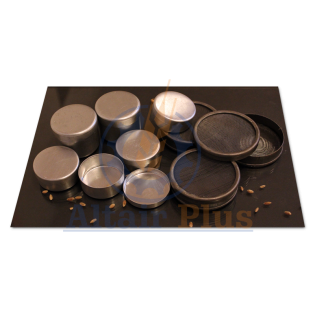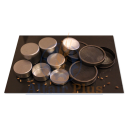Altair Plus Company provides warranty and after-warranty service and repair of products manufactured by the company. Warranty periods are indicated in the accompanying documentation and may vary depending on the type of product.
Payment is carried out according to the invoice issued by prior agreement with the manager of the company. You can pay an account at any bank or transfer money through another bank account.
Delivery across Ukraine of the goods ordered by you can be carried out by the cargo-transport companies “Delivery”, “SAT”, “Novaya Pochta”, “Night Express”. Delivery is carried out within 1-3x working days in the most appropriate way for a particular order at the expense of the buyer.
Aluminum boxes are used in laboratory tests for drying samples of grain, flour, sand, soil and other bulk materials, as well as for storage of samples.
The German-speaking “Büchse” means “bank”. Boxes are used in various industries: grain, construction, chemical, mining and others.
The German-speaking “Büchse” means “bank”. Boxes are used in various industries: grain, construction, chemical, mining and others.
PE "Altair Plus" produces:?
- Aluminum box № 3 (Ø 50mm, height 20mm) is used in determining the moisture content of grain (GOST 13586.5-93), flour, compound feed.
- Aluminum box № 5 (Ø 50mm, height 40mm) is used in the analysis of soil samples, sand mixtures and other bulk materials.
- Aluminum box № 5 (Ø 50mm, height 40mm) is used in the analysis of soil samples, sand mixtures and other bulk materials.
As it is often forbidden direct contact of test substances with many types of equipment (scales, scales of drying cabinets, porcelain pallets of desiccators, etc.), in the laboratory, the boxes effectively serve as a kind of separator.
Description of equipment
Structurally, the box is made in the form of a hollow container with cylindrical walls and a flat bottom by a method of stamping from sheet aluminum.
Most often, the inner and outer edges of the walls are made with radial chamfer, which reduces the possibility of mechanical damage in the form of various irregularities, burrs. This also reduces the likelihood of injury to the skin during operation.
The area between the bottom and the walls has a radial rounding, which forms a smooth transition, which, along with the smoothness of the inner surfaces, determines less sticking of the components of the laboratory samples (so characteristic of bulk substances with small particle sizes).
Main material properties of boxes:
The high melting point (above 650 ° C) allows the tanks to easily withstand sufficiently strong heating, including annealing (in the case of specimens with particularly strong hygroscopicity).
The low density (2.7 g / cm³) gives the laboratory "boxes" ease and convenience of work.
Weak paramagnetic properties - magnetic fields can orient aluminum atoms across the field, increasing the resulting magnetic effect somewhat, but without an external magnetizing action, the aluminum box is non-magnetic. Which also prevents finely dispersed substances from sticking to the walls.
High thermal conductivity (up to 203.5 W / (m · K)) creates conditions for rapid heating and cooling of the tanks.
Corrosion resistance - is the result of a thin and high strength oxide film, which is rapidly formed on aluminum products in the air environment. Film oxidation perfectly protects the material from the destructive effects of the industrial atmosphere, water vapor (at temperatures up to 500 ° C) and natural fresh water (up to 180 ° C).
Most often, sheet metal for products is made of aluminum with the addition of manganese (alloys AMC), which contributes to the increase of corrosion resistance. Therefore, aluminum containers, which have a sufficient amount of manganese, when stamping occurs stabilizing structure of metal sludge, which gives good indicators of rigidity and hardness. At 20 ° C, the AMz alloy has a tensile strength of up to 220 MPa.
You can buy aluminum boxes and other laboratory equipment at Altair Plus using the organization's contact information on the Contacts page.

























